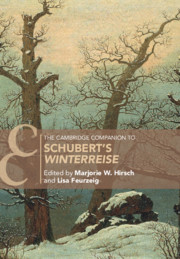Book contents
- The Cambridge Companion to Schubert’s Winterreise
- Cambridge Companions to Music
- The Cambridge Companion to Schubert’s Winterreise
- Copyright page
- Dedication
- Contents
- Figures
- Tables
- Music Examples
- Contributors
- Acknowledgments
- Note on Pitch
- Chronology
- Abbreviations
- Introduction: An Endless Winter Journey
- Part I Schubert’s Winterreise and Its Musical Heritage
- Part II Die Winterreise: Poetic Cycle
- Part III Cultural and Historical Contexts
- 6 Two Perspectives on Psychology in Winterreise
- 7 Nature and Science in Winterreise
- 8 On the Move: Outcasts, Wanderers, and the Political Landscape of Die Winterreise
- Part IV Winterreise: Song Cycle
- Part V Winterreise After 1827
- Appendix
- Guide to Further Reading
- Index
8 - On the Move: Outcasts, Wanderers, and the Political Landscape of Die Winterreise
from Part III - Cultural and Historical Contexts
Published online by Cambridge University Press: 02 February 2021
- The Cambridge Companion to Schubert’s Winterreise
- Cambridge Companions to Music
- The Cambridge Companion to Schubert’s Winterreise
- Copyright page
- Dedication
- Contents
- Figures
- Tables
- Music Examples
- Contributors
- Acknowledgments
- Note on Pitch
- Chronology
- Abbreviations
- Introduction: An Endless Winter Journey
- Part I Schubert’s Winterreise and Its Musical Heritage
- Part II Die Winterreise: Poetic Cycle
- Part III Cultural and Historical Contexts
- 6 Two Perspectives on Psychology in Winterreise
- 7 Nature and Science in Winterreise
- 8 On the Move: Outcasts, Wanderers, and the Political Landscape of Die Winterreise
- Part IV Winterreise: Song Cycle
- Part V Winterreise After 1827
- Appendix
- Guide to Further Reading
- Index
Summary
The protagonist of Winterreise wanders through a landscape that is both real and imagined. Banished from one home but unable to conceive another, he follows a path that circles back on itself repeatedly, leading only to exhaustion and defeat. Yet while the singer of Winterreise appears to inhabit a lonely landscape, Wilhelm Müller’s verses and their musical setting by Franz Schubert would also have evoked a concrete social world for their audiences, that of the road (Landstrasse). The road, by its very nature, was filled with people on the move, some of them (journeymen, pilgrims) heading purposefully from one place to another, but others with no particular destination, whose poverty, criminality, or “dishonorable” status banished them from their towns and villages. These last types, the “wandering people” (fahrendes Volk), had become well established as an object of public fascination and state scrutiny by the eighteenth century.
- Type
- Chapter
- Information
- The Cambridge Companion to Schubert's ‘Winterreise' , pp. 129 - 144Publisher: Cambridge University PressPrint publication year: 2021

